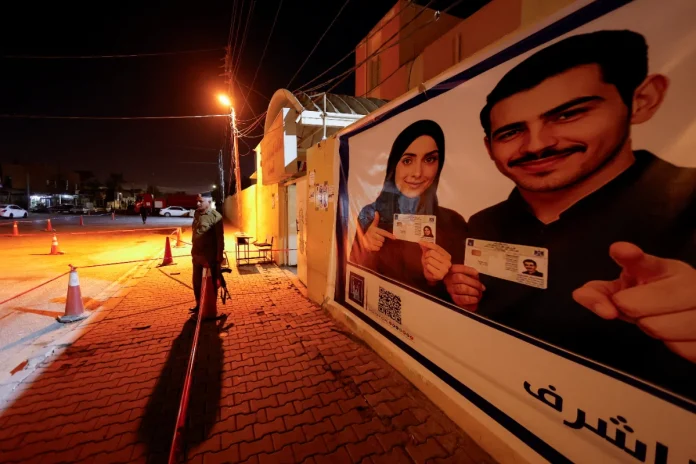Iraqis vote in a parliamentary election marked by relative calm, with PM Sudani seeking a second term and key Shiite cleric Sadr boycotting.
BAGHDAD: Iraqis voted for a new parliament on Tuesday in a rare moment of calm for the nation of 46 million people.
The election comes at a pivotal time for Iraq and the wider Middle East region, with both Iran and the United States closely monitoring the outcome.
Iraq has experienced unusual stability in recent years as it attempts to move beyond decades of war and repression under Saddam Hussein.
Despite this relative calm, the country continues to suffer from poor infrastructure, failing public services and endemic corruption.
Many Iraqis have lost hope that elections can bring meaningful change to their daily lives.
University student Al-Hassan Yassin expressed widespread skepticism, saying “Every four years, the same thing happens.”
“We don’t see young faces or new energies capable of making a change,” he added.
Polling stations opened at 7:00 am local time (0400 GMT) and closed at 6:00 pm (1500 GMT).
More than 7,740 candidates competed for the 329 parliamentary seats, with nearly one-third being women.
Only 75 independents participated under an electoral law that many believe favours larger parties.
Over 21 million people were eligible to vote, though turnout was expected to drop below the 41% recorded in 2021.
Prime Minister Mohammed Shia al-Sudani hopes for a second term after campaigning on stability and reconstruction achievements.
Sudani rose to power in 2022 through the Coordination Framework, a ruling alliance of Shiite parties with ties to Iran.
He has highlighted his success in keeping Iraq relatively unscathed by regional turmoil.
Securing a large parliamentary bloc does not guarantee Sudani a second term, as the next prime minister will be chosen by whichever coalition forms the largest bloc.
The election was marked by the absence of influential Shiite cleric Moqtada Sadr, who urged his followers to boycott what he called a “flawed election”.
In 2021, Sadr secured the largest bloc before withdrawing from parliament following a government formation dispute.
The political rift culminated in deadly fighting in Baghdad the following year.
Sunni parties competed separately, with former speaker Mohammed al-Halbussi expected to perform well.
In the autonomous Kurdistan region, the rivalry between the Kurdistan Democratic Party and Patriotic Union of Kurdistan remained fierce.
Iraq has long sought to maintain balance between its alliances with both Iran and the United States.
This balancing act becomes more crucial as the Middle East undergoes significant geopolitical shifts.
Iran hopes to preserve its influence in Iraq, its only close ally remaining outside Israel’s direct crosshairs.
Early last year, pro-Iran factions listed as terrorist groups by Washington stopped targeting American forces in Iraq.
The United States has been pressuring Iraq to disarm these pro-Iran groups.
Washington recently appointed Mark Savaya as its special envoy to Iraq.
Savaya has called to free Iraq from what he described as Iran’s “malign” interference through its proxies. – AFP








